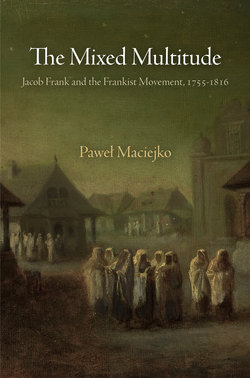The Mixed Multitude

Реклама. ООО «ЛитРес», ИНН: 7719571260.
Оглавление
Pawel Maciejko. The Mixed Multitude
Отрывок из книги
The Mixed Multitude
Published in association with
.....
The Dönmeh formed a close-knit group shunning exogamous marriage with either Jews or Muslims, and they developed their own version of Sabbatian theology, focusing on the radical duality between the Torah of the Created World (torah de-beri’ah) and the new spiritual Torah known as the Torah of Emanation (torah de-atsilut). With the coming of the messiah, the former—identified with the commandments of Judaism—was replaced with the latter, and Sabbatai Tsevi’s “strange deeds” provided a pattern for normative behavior. Accordingly, the Dönmeh’s brand of Sabbatianism acquired a very pronounced antinomian tendency, whereby ritual violations of the principles and rites of Jewish religion became a significant part of religious practice. Since the advent of redemption signified liberation from the yoke of the commandments, their further observance would be not only senseless, but blasphemous. Conversely, almost the only way to demonstrate that the redemption had arrived was to break the laws and statutes of the unredeemed world. In the words of Rabbi Moses Hagiz: “It is their custom to argue that with the arrival of Sabbatai Zevi, the sin of Adam has already been corrected and the good selected out of the evil and the ‘dross.’ Since that time, according to them, a new Torah has become law under which all manner of things formerly prohibited are now permitted, not least the categories of sexual intercourse hitherto prohibited. For since everything is pure, there is no sin or harm in these things.”82
Jacob Querido died during a pilgrimage to Mecca in 1690. As the principle of leadership among the Dönmeh was based on the idea of reincarnation of Sabbatai Tsevi’s soul into a new leader, several pretenders appeared, each claiming to be the new abode of the soul of the messiah. The Salonika group splintered into three principal branches—the Kavalieros, the Jakubis, and the Koniosos; the most important one for the present discussion is the last, led by Berukhiah Russo (in Islam: Osman Baba; 1677–1720).83 Berukhiah’s group was the most radical among the Dönmeh subsects: not only did he believe that the traditional laws of Judaism had been abrogated, but he claimed that, with the arrival of the messianic era, the thirty-six most serious transgressions punishable by the ultimate punishment of karet84 had turned into positive commandments (the category includes all sexual prohibitions, mainly various forms of incest). In 1716, Berukhiah’s followers declared him the incarnation not merely of the soul of the human messiah Sabbatai, but also of the God of Israel (the idea of the divinity of the messiah or some form of the doctrine of divine incarnation had appeared in earlier Sabbatian theology but was eschewed by most Sabbatians). His group promulgated this claim among other Sabbatian groups, and until his death in 1720, Berukhiah was worshiped by some Sabbatians of Salonika as a divine being, Signor Santo, Holy Lord.
.....